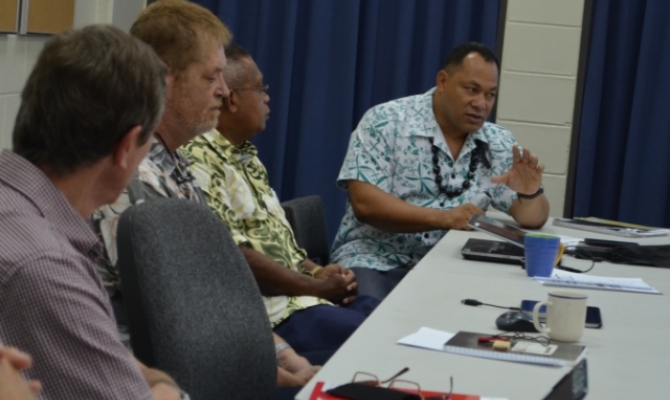
Island and Ocean Ecosystems
The Pacific Invasives Partnership, established in 2009, is having its annual planning meeting at the Secretariat of the Pacific Regional Environment Programme (SPREP), in Apia this week.
The partnership comprises over 30 organisations and technical experts that work towards raising the profile of invasive species, securing funding and resources for invasive species management and biosecurity. A vital objective of the Pacific Invasives Partnership is to help build the capacity of Pacific people to manage the negative impacts of invasive species.
"The economic impact of invasive species upon our Pacific region is in the billions of dollars and doing what we all can to help address this issue is crucial," said SPREP Deputy Director General, Mr. Kosi Latu as he addressed the meeting today.
"We have seen significant positive outcomes spearheaded by this partnership, and, as our invasives problem grows, our efforts need to grow to match. This annual planning meeting is key to action coordination."

In 2013, the Pacific Invasives Partnership achieved a number of its planned objectives. It expanded the Pacific Invasives Learning Network cross-sector and multi-agency teams to Tonga and Vanuatu, completed the Pacific Invasive Species Capacity Development Strategy and helped build Pacific capacity for improved inter-island biosecurity and management of weeds, invasive ants and ballast water.
One of the key topics of discussion for the year ahead for the Partnership is a Pacific invasives proposal endorsed by SPREP members for the 6th round of funding from the Global Environment Facility.
The planning meeting takes place from 24 to 28 February. It is chaired by Mr. Josua Wainiqolo, the Biosecurity and Trade Facilitation Coordinator from the Land Resources Division of the Secretariat of the Pacific Community.
Participants at this planning meeting are from the Hawaii AntLab, Pacific Cooperative Studies Unit, SPREP, United Nations Environment Programme, SPC, US National Invasive Species Council, Landcare Research NZ, Island Conservation, Pacific Invasives Initiative, BirdLife International – Pacific Partnership and the Micronesia Regional Invasive Species Council.
The partnership comprises over 30 organisations and technical experts that work towards raising the profile of invasive species, securing funding and resources for invasive species management and biosecurity. A vital objective of the Pacific Invasives Partnership is to help build the capacity of Pacific people to manage the negative impacts of invasive species.
"The economic impact of invasive species upon our Pacific region is in the billions of dollars and doing what we all can to help address this issue is crucial," said SPREP Deputy Director General, Mr. Kosi Latu as he addressed the meeting today.
"We have seen significant positive outcomes spearheaded by this partnership, and, as our invasives problem grows, our efforts need to grow to match. This annual planning meeting is key to action coordination."

In 2013, the Pacific Invasives Partnership achieved a number of its planned objectives. It expanded the Pacific Invasives Learning Network cross-sector and multi-agency teams to Tonga and Vanuatu, completed the Pacific Invasive Species Capacity Development Strategy and helped build Pacific capacity for improved inter-island biosecurity and management of weeds, invasive ants and ballast water.
One of the key topics of discussion for the year ahead for the Partnership is a Pacific invasives proposal endorsed by SPREP members for the 6th round of funding from the Global Environment Facility.
The planning meeting takes place from 24 to 28 February. It is chaired by Mr. Josua Wainiqolo, the Biosecurity and Trade Facilitation Coordinator from the Land Resources Division of the Secretariat of the Pacific Community.
Participants at this planning meeting are from the Hawaii AntLab, Pacific Cooperative Studies Unit, SPREP, United Nations Environment Programme, SPC, US National Invasive Species Council, Landcare Research NZ, Island Conservation, Pacific Invasives Initiative, BirdLife International – Pacific Partnership and the Micronesia Regional Invasive Species Council.